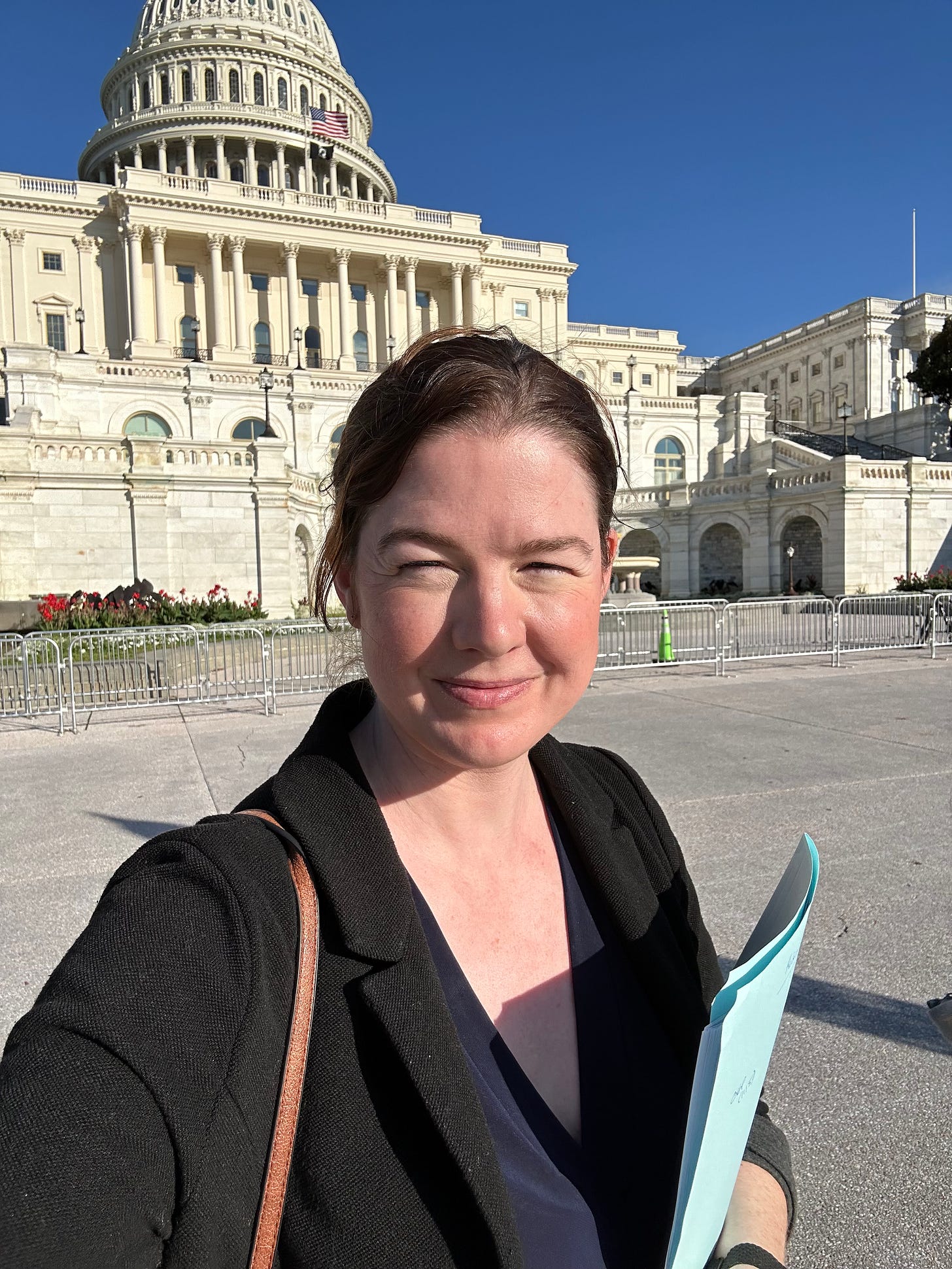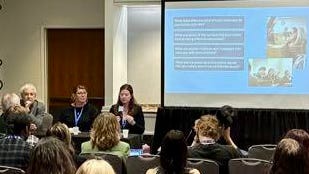What a Time to Be in D.C.
Plus: Maine's paid parent program is completely inaccessible; Florida moms continue fight for required nursing services; Arizona families get a brief reprieve from drastic cuts
It was an interesting time to be in the nation’s capital.
Last week, I roamed the hallways of the many buildings surrounding the U.S. Capitol — the senators’ and congressmen’s offices where staff actually work. I have no prior experience to compare it to, but things seemed quiet as the government shutdown continued its third week. Several staffers were still working despite growing uncertainty about when their next paycheck would come.
My fellow medical mama Lisa Ledson and I could empathize. We know a lot about doing important jobs without pay. We met with staff from five of Oregon’s eight representatives in U.S. Congress. Our argument? Remove just 10 words in federal statute.
Current federal law requires that Medicaid home care jobs go to: “...an individual who is qualified to provide such services and who is not a member of the individual’s family...”
Getting rid of those 10 words would not create a mandate on states, but would represent a major symbolic victory. This could be the first domino to fall in a system that would finally begin to recognize the extraordinary, daily, life-saving actions of family caregivers.
Alas, not much policymaking of any sort is happening right now. Republicans are on one side, firm in their passage of the One Big Beautiful Bill Act, which is likely to have major ripple effects throughout state budgets. (My home state of Oregon expects to lose $15 billion over 10 years.) Democrats are on the other side, almost exclusively talking about the increased costs of health care and health insurance and the impacts to the general Medicaid population. We continue to hold out hope that someone is looking out for disabled kids’ services specifically in this stalemate.
But I wasn’t primarily in D.C. to lobby. I was there to give a presentation at MediaFest25 on my other passion project — government transparency. My invitation came from Frank LoMonte, the lead attorney for CNN and such a friend to the First Amendment that the Society of Professional Journalists surprised him with a major award while I was there. Frank hopes our panel discussion on successful efforts to improve government transparency laws will spur other journalists to take up the issues that plague their states.
At a much bigger panel discussion than mine at the same conference, Dean Baquet, executive editor of The New York Times from 2014-2022, said times have changed a lot since he stumbled into a newsroom in New Orleans and decided he liked the idea of working in a “bar”-like atmosphere. Baquet said today’s journalists have more “humility” (a good thing) and that local newspapers are innovating in ways he would have never imagined. I especially appreciated that he validated the style of journalism that I find myself doing in recent years — advocacy + journalism. “It’s always had a place in journalism,” he said. “The pantheon of journalism has always been wider than most people remember.”
On the same panel, Kat Tenbarge — author of feminist Spitfire News, a fellow Substack newsletter — advised journalists to treat trauma victims with care. She explained the concept of “institutional betrayal” — how the media, police or other institutions that one goes to for help can end up compounding or amplifying the original trauma. That certainly resonates with me around our disability services systems and how the labor and information they demand feels especially violating because they are supposed to be the ones who are helping.
I also attended presentations from States Newsroom — a $17 million nonprofit that is breathing life back into state legislative coverage — and Trusting News — a nonprofit dedicated to research on how to improve public trust in reporting. The most fascinating session I went to was a webinar from Google on its new Pinpoint tool, which allows journalists to analyze — and publish — troves of documents. Within minutes, I had found a cache from the Associated Press and was reading Charlie Kirk’s suspected killer’s indictment, which contained text messages explaining his motives in his own words. (“I’ve had enough of [Charlie Kirk’s] hatred. Some hate can’t be negotiated out.”) The potential of such a tool to provide skeptical audiences evidence and information in real time is very exciting.
As Frank said in his acceptance speech for SPJ’s Wells Memorial Key: “People say having a child is the ultimate act of optimism, but I think it’s doing journalism. You come to work thinking that if you put enough good information into the hands of good people, good things will happen.”
In today’s polluted information environment, I don’t know any other way forward.
Medical Motherhood’s news round up
Snippets of news and opinion from outlets around the world. Click the links for the full story.
• From Portland Press Herald: “Two years after Maine passed a paid parent caregiver law, experts say it’s inaccessible”
Andrea Dole remembers feeling hopeful in 2023 when lawmakers passed a law to pay parents of severely disabled children as caregivers.
“I felt so validated and energized. We had wind at our sails,” said Dole, who spent years advocating for the program. Her 10-year-old son has microcephaly and cerebral palsy and requires around-the-clock care.
Two years later, experts say, the law is still inaccessible to parents.
Maine’s Medicaid program allows home health agencies to hire parents as caregivers, but it also mandates that those agencies have a Medicare license. The problem, experts say, is that agencies licensed under Medicare don’t typically serve the pediatric population, creating a barrier for parents trying to get paid as caregivers.
“Parents can’t sign up. This program is not happening at all,” said Nancy Cronin, executive director of the Maine Developmental Disabilities Council, a quasi-governmental agency.
[…]“The program is on the books, but we can’t use it,” Dole, 44, of Belfast, said. “I went through a lot of work and personal sacrifice to get my ducks in a row to provide the care that my son needs, only to be told ‘no.’ I’m back at square one.”
She said it’s “a kick in the gut, a slap in the face. We are still invisible. Our kids are still invisible. It’s incredibly painful.”
[…]State Sen. Joe Baldacci, D-Bangor, who backed the bill to pay parents as caregivers, placed the blame on what he called an “intransigent” and “incompetent” Maine DHHS and Gov. Janet Mills’ office.
Ben Goodman, a spokesperson for Mills, did not respond to requests seeking comment.[…]
• From Tampa Bay Times: “Florida moms of disabled children denied medical care pin hope on old lawsuit”
When Caroline Hagan was approved for at-home nursing care, it was a blessing for her family.
The Lithia girl was born with Down syndrome, a congenital heart disease, hypothyroidism and a severe pediatric feeding disorder. She takes 15 medications every day, either through a feeding tube or a spray dispenser, and needs constant care.
In March, Medicaid administrators agreed with the girl’s doctor to increase her weekly in-home nursing schedule from 50 to 90 hours. One nurse accompanied her to school, while another took over at 3 p.m., allowing her mom, Alyssa Hagan, to work her full-time administrative job.
But within three weeks, Sunshine Health, the company hired to run Florida’s program for medically fragile children, reversed its decision, saying the extra care wasn’t medically necessary.
[…]The Tampa Bay Times reported in June that Sunshine Health has denied at-home nursing for more than 100 medically fragile children this year. The company has continued to cut in-home nursing schedules and, in some cases, also refused to pay for prescribed medication. Appeals against those decisions reviewed by Florida Agency for Health Care Administration officers have mostly failed.
Now, Hagan and other families are pinning their hopes on a 13-year-old federal lawsuit that ordered Florida to provide skilled in-home nursing to medically complex children so the burden of care doesn’t fall on parents alone.
In a rare legal move, eight mothers of disabled children who were denied care have filed sworn declarations in the case, outlining how the denial of medical services is putting their children’s health at risk.
[…]Sunshine Health issued the denials even though Florida is under a federal injunction to meet benchmarks to provide skilled in-home nursing so that caring for medically complex children doesn’t fall on parents alone.
“The consequences of these denials are dire,” [Matt Dietz, a professor and clinical director of the Disability Inclusion and Advocacy Law Clinic at Nova Southeastern University] wrote in his legal brief. “Parents are forced to forgo employment, delay their own medical care, and provide complex medical interventions without professional support.”
The state is paying Sunshine Health $12.9 billion to run the Children’s Medical Services program over roughly 5 ½ years. It serves medically fragile children and youths up to the age of 20.[…]
• From Arizona Mirror: “Hobbs pauses drastic cuts to children’s disability services following outcry from families”
Parents of Arizona children with developmental disabilities who were scrambling to deal with massive service cuts finally got some good news today, when the state paused the implementation of those cuts.
Leading up to and following Oct. 1, when Arizona’s Medicaid program began using those new rules to assess the hours of service those children qualify for, desperate parents who had little notice of the drastic nature of the changes begged the state to amend the rules. Some said the changes would leave them in fear of homelessness and their children at risk of being institutionalized.
On Oct. 15, just two weeks after the Arizona Healthcare Cost Containment System, the state’s Medicaid program better known as AHCCCS, began to use the rules, Gov. Katie Hobbs announced a pause on their implementation. Doing so, she said in a written statement, will give the state time to undergo an emergency rulemaking process to amend the new assessment tool to allow exceptions for kids with extraordinary needs.
[…]The new rules regarding how many hours the state will pay for either a parent or outside caregiver to provide attendant care, or supervision for certain tasks, and habilitation, or skill development to children served by DDD were the result of huge spending increases for those services last year.
While Republicans in the Arizona legislature blamed DDD’s Parents as Paid Caregivers Program for the cost increases, increases in paid hours for parents and outside caregivers both contributed to those increases.
After months of protests from members of and advocates for the developmentally disabled community, in April the state finally passed a bill that provided $122 million in gap funding to DDD to deal with cost increases without sudden cuts to services.
DDD and AHCCCS immediately began developing a new assessment tool to evaluate how many attendant care and habilitation hours each child could receive, based on changes in the law. But many parents didn’t find out how drastic the cuts to those services would be until early September.
[…]“This is a pause,” [Michele Thorne, one of the advocates for the developmentally disabled community] said. “It doesn’t mean that the rollout (of the new rules) won’t happen and that cuts won’t be made. At some point, we have to stabilize the system.”[…]
Medical Motherhood brings you quality news and information each Sunday for raising disabled and neurodivergent children. Get it delivered to your inbox each week or give a gift subscription. Subscriptions are free, with optional tiers of support. Our paid subscribers make this work possible! Not ready to subscribe but like what you read here? Buy me a coffee.
Follow Medical Motherhood on Facebook, Bluesky, X, TikTok, Instagram or Pinterest. Visit the Medical Motherhood merchandise store.




